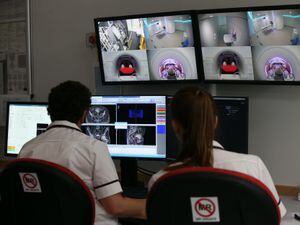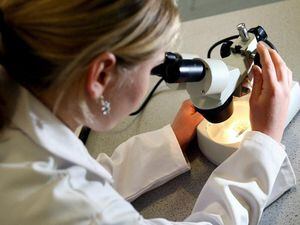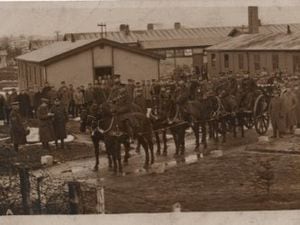Pandemic sees Midlands cancer care hit by delays
Dozens of cancer patients at hospital trusts in the Black Country and Staffordshire had been waiting longer than two months for treatment in February, new figures show.

As NHS performance against the two-month target hit a record low nationally, Macmillan Cancer Support said the latest statistics reveal the enduring impact of the Covid pandemic on cancer services.
NHS data shows that at the University Hospitals of North Midlands (UHNM) NHS Trust, just 69.3 per cent of cancer patients started treatment within 62 days of an urgent GP referral in February. It means 50 patients had waited longer than two months in February – but the figure was up from 64.4 per cent seen in January.
At the Royal Wolverhampton NHS Trust, just 42.9 per cent of cancer patients started treatment within 62 days of an urgent referral. It meant 46 patients had waited longer than two months in February – with the figure also down from 45.7 per cent recorded in January.
Just 61.7 per cent of cancer patients started treatment within two months at the Sandwell and West Birmingham Hospitals NHS Trust. It meant 25 patients had waited longer than two months in February – but the figure was slightly up from the 60.2 per cent seen in January.
The figures show that at the Dudley Group NHS Foundation Trust, just 68.5 per cent of cancer patients started treatment within 62 days of an urgent GP referral in February. It meant 18 patients had waited longer than two months in February – with the figure down from 70.6 per cent in January.
And at the Walsall Healthcare NHS Trust, just 67.1 per cent of cancer patients started treatment within two months. It meant 15 patients had waited longer than two months in February – with the figure down from 75.3 per cent in January.
A spokesman on behalf of on behalf of The Royal Wolverhampton NHS Trust and Walsall Healthcare NHS Trust said: “Throughout the pandemic The Royal Wolverhampton NHS Trust and Walsall Healthcare NHS Trust, along with hospitals across the country, postponed non-emergency operations to avoid putting patients at risk and ensure that NHS resources, beds, and equipment were available to treat patients who were critically ill with Covid-19. There was also a need to redeploy staff to care for patients in our Critical Care Units.
“We are now working together at pace, to reduce elective waiting lists and ensure that patients who need a procedure are seen as quickly as possible, in order of clinical need and urgency.”

Paul Bytheway, UHNM chief operating officer, said: “We have taken significant steps to ensure there is resource and capacity to deliver cancer services while continuing to provide safe, quality care for all our patients during a pandemic.
“This has meant that some UHNM cancer services have been moved to independent sector facilities to ensure patients can continue to receive treatment during the Covid-19 outbreak.
“We would like to continue to assure our patients that we have established infection prevention measures in place to help limit the risk of spreading coronavirus and it is important that patients attend their appointments.
“All patients and visitors to our hospitals will also be required to wear face coverings, maintain social distancing and regularly wash hands or use anti-bacterial hand gel.”
Lower
Across England, just 69.7 per cent of patients received cancer treatment within two months of an urgent referral in February – the worst performance on record. It means the NHS target has now not been met for nearly three years.
And while there were slightly more referrals for urgent cancer investigations in February compared to the previous month, Macmillan said the number of people starting treatment "remains lower than it would expect".
A Department of Health and Social Care spokesperson said the Government is committed to providing high quality cancer care, with cancer diagnosis and treatment remaining "a top priority" throughout the pandemic.
"More than 2.5 million urgent referrals were made within waiting time targets in the past year alone and for every coronavirus patient, two cancer patients received treatment," they added.
Pandemic causes fall in number of scans completed
The number of scans used to diagnose cancer dropped as the coronavirus pandemic hit hospital services across the Black Country and Staffordshire, figures show.
A pause on non-urgent treatment, a shortage of radiographers and a reduction in people coming forward for tests are said to have affected scans across England.
Teams at University Hospitals of North Midlands NHS Trust performed more than 30,000 fewer imaging scans between March last year and February in comparison to the same period in 2019-20, NHS figures show. Imaging tests that can be used to diagnose or detect cancer were carried out 116,045 times during that time – a 23 per cent drop. The number of brain MRI scans fell by 19 per cent while there were 25 per cent fewer chest X-rays performed and a drop of 22 per cent in ultrasounds of the pelvis and abdomen.
More than 20,000 fewer imaging scans were performed at the Royal Wolverhampton NHS Trust between March last year and February, compared to the same period the previous year. Imaging tests were carried out 73,655 times during that time – a 25 per cent drop. The number of brain MRI scans fell by 19 per cent while there were 24 per cent fewer chest X-rays performed and a drop of 37 per cent in ultrasounds of the pelvis and abdomen.
Fewer
There were also more than 20,000 fewer imaging scans carried out at the Sandwell and West Birmingham Hospitals NHS Trust in the same period. Imaging tests were carried out 72,100 times during that time – a 24 per cent drop. The number of brain MRI scans fell by 13 per cent while there were 25 per cent fewer chest X-rays performed and a drop of 27 per cent in ultrasounds of the pelvis and abdomen.
At the Dudley Group NHS Foundation Trust, more than 10,000 fewer imaging scans were carried out compared to the previous year. Imaging tests were carried out 55,465 times during that time – a 16 per cent drop. The number of brain MRI scans fell by nine per cent while there were 14 per cent fewer chest X-rays performed and a drop of 25 per cent in ultrasounds of the pelvis and abdomen.
The teams at Walsall Healthcare NHS Trust performed more than 9,500 fewer imaging scans between the same period, in comparison to the previous year. Imaging tests were carried out 43,520 times during that time – an 18 per cent drop. The number of brain MRI scans fell by 19 per cent while there were 18 per cent fewer chest X-rays performed and a drop of 24 per cent in ultrasounds of the pelvis and abdomen.
Across England the number of scans used to diagnose or discount cancer dropped by a quarter to around 8.5 million as lockdown measures gripped the health service.





